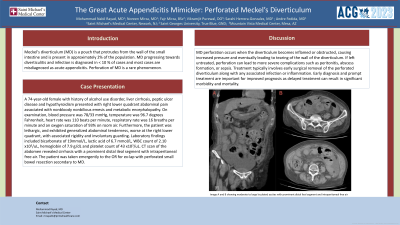Monday Poster Session
Category: Small Intestine
P2671 - The Great Acute Appendicitis Mimicker: Perforated Meckel’s Diverticulum
Monday, October 23, 2023
10:30 AM - 4:15 PM PT
Location: Exhibit Hall

Has Audio

Noreen Mirza, MD
Saint Michael's Medical Center, New York Medical College
Newark, New Jersey
Presenting Author(s)
Mohammad Nabil Rayad, MD1, Noreen Mirza, MD1, Fajr Mirza, BSc2, Vikramjit S. Purewal, DO3, Sarahi Herrera-Gonzalez, MD1, Andre Fedida, MD1
1Saint Michael's Medical Center, New York Medical College, Newark, NJ; 2St. George's University, Newark, NJ; 3Mountain Vista Medical Center, Mesa, AZ
Introduction: Meckel's diverticulum (MD) is a pouch that protrudes from the wall of the small intestine and is present in approximately 2% of the population. MD progressing towards diverticulitis and infection is diagnosed in < 10 % of cases and most cases are misdiagnosed as acute appendicitis. Perforation of MD is a rare phenomenon.
Case Description/Methods: A 74-year-old female with history of alcohol use disorder, liver cirrhosis, peptic ulcer disease and hypothyroidism presented with right lower quadrant abdominal pain associated with nonbloody nonbilious emesis and metabolic encephalopathy. On examination, blood pressure was 78/33 mmHg, temperature was 96.7 degrees Fahrenheit, heart rate was 110 beats per minute, respiratory rate was 16 breaths per minute and an oxygen saturation of 93% on room air. Furthermore, the patient was lethargic, and exhibited generalized abdominal tenderness, worse at the right lower quadrant, with associated rigidity and involuntary guarding. Laboratory findings included bicarbonate of 19mmol/L, lactic acid of 6.7 mmol/L, WBC count of 2.10 x103/uL, hemoglobin of 7.9 g/dL and platelet count of 43 x103/uL. CT scan of the abdomen revealed cirrhosis with a prominent distal ileal segment with intraperitoneal free air. The patient was taken emergently to the OR for ex-lap with perforated small bowel resection secondary to MD.
Discussion: MD perforation occurs when the diverticulum becomes inflamed or obstructed, causing increased pressure and eventually leading to tearing of the wall of the diverticulum. If left untreated, perforation can lead to more severe complications such as peritonitis, abscess formation, or sepsis. Treatment typically involves early surgical removal of the perforated diverticulum along with any associated infection or inflammation. Early diagnosis and prompt treatment are important for improved prognosis as delayed treatment can result in significant morbidity and mortality.

Disclosures:
Mohammad Nabil Rayad, MD1, Noreen Mirza, MD1, Fajr Mirza, BSc2, Vikramjit S. Purewal, DO3, Sarahi Herrera-Gonzalez, MD1, Andre Fedida, MD1. P2671 - The Great Acute Appendicitis Mimicker: Perforated Meckel’s Diverticulum, ACG 2023 Annual Scientific Meeting Abstracts. Vancouver, BC, Canada: American College of Gastroenterology.
1Saint Michael's Medical Center, New York Medical College, Newark, NJ; 2St. George's University, Newark, NJ; 3Mountain Vista Medical Center, Mesa, AZ
Introduction: Meckel's diverticulum (MD) is a pouch that protrudes from the wall of the small intestine and is present in approximately 2% of the population. MD progressing towards diverticulitis and infection is diagnosed in < 10 % of cases and most cases are misdiagnosed as acute appendicitis. Perforation of MD is a rare phenomenon.
Case Description/Methods: A 74-year-old female with history of alcohol use disorder, liver cirrhosis, peptic ulcer disease and hypothyroidism presented with right lower quadrant abdominal pain associated with nonbloody nonbilious emesis and metabolic encephalopathy. On examination, blood pressure was 78/33 mmHg, temperature was 96.7 degrees Fahrenheit, heart rate was 110 beats per minute, respiratory rate was 16 breaths per minute and an oxygen saturation of 93% on room air. Furthermore, the patient was lethargic, and exhibited generalized abdominal tenderness, worse at the right lower quadrant, with associated rigidity and involuntary guarding. Laboratory findings included bicarbonate of 19mmol/L, lactic acid of 6.7 mmol/L, WBC count of 2.10 x103/uL, hemoglobin of 7.9 g/dL and platelet count of 43 x103/uL. CT scan of the abdomen revealed cirrhosis with a prominent distal ileal segment with intraperitoneal free air. The patient was taken emergently to the OR for ex-lap with perforated small bowel resection secondary to MD.
Discussion: MD perforation occurs when the diverticulum becomes inflamed or obstructed, causing increased pressure and eventually leading to tearing of the wall of the diverticulum. If left untreated, perforation can lead to more severe complications such as peritonitis, abscess formation, or sepsis. Treatment typically involves early surgical removal of the perforated diverticulum along with any associated infection or inflammation. Early diagnosis and prompt treatment are important for improved prognosis as delayed treatment can result in significant morbidity and mortality.

Figure: Image A and B showing moderate to large loculated ascites with prominent distal ileal segment and intraperitoneal free air
Disclosures:
Mohammad Nabil Rayad indicated no relevant financial relationships.
Noreen Mirza indicated no relevant financial relationships.
Fajr Mirza indicated no relevant financial relationships.
Vikramjit Purewal indicated no relevant financial relationships.
Sarahi Herrera-Gonzalez indicated no relevant financial relationships.
Andre Fedida indicated no relevant financial relationships.
Mohammad Nabil Rayad, MD1, Noreen Mirza, MD1, Fajr Mirza, BSc2, Vikramjit S. Purewal, DO3, Sarahi Herrera-Gonzalez, MD1, Andre Fedida, MD1. P2671 - The Great Acute Appendicitis Mimicker: Perforated Meckel’s Diverticulum, ACG 2023 Annual Scientific Meeting Abstracts. Vancouver, BC, Canada: American College of Gastroenterology.
